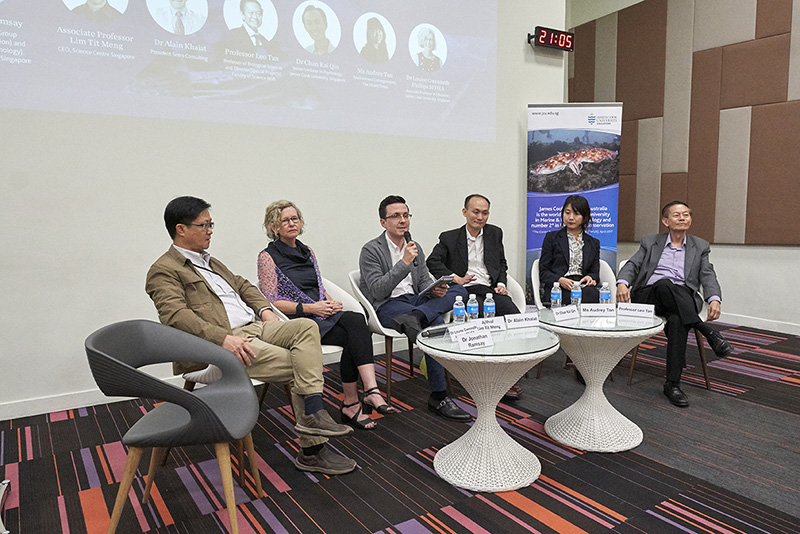Media Releases
Scientific literacy in a post-truth world
Media Releases
This panel discussion answered critical questions and explored key issues in scientific literacy.
The panel discussion — “Resilience through understanding: Scientific literacy in a post-truth world” — took place at the Singapore campus of James Cook University on 10 September 2019.
A distinguished group of experts was assembled to share valuable insights and perspectives on the importance of scientific literacy and how we can improve it.
Moderated by Dr Jonathan Ramsay — Head of Academic Group for Psychology & Education, and Senior Lecturer in Psychology at James Cook University in Singapore — the panel discussion comprised of the following panellists:
- Professor Leo Tan – Professor of Biological Sciences, and Director of Special Projects at the Science Faculty, National University of Singapore
- Dr Lim Tit Meng – Chief Executive Officer of Science Centre Singapore
- Dr Louise Phillips – Associate Professor of Education at James Cook University in Singapore
- Dr Chan Kai Qin – Senior Lecturer in Psychology at James Cook University in Singapore
- Ms Audrey Tan – Environment Correspondent at The Straits Times
 (From left to right: Dr Lim Tit Meng; Dr Louise Phillips; Dr Jonathan Ramsay; Dr Chan Kai Qin; Ms Audrey Tan; Professor Leo Tan)
(From left to right: Dr Lim Tit Meng; Dr Louise Phillips; Dr Jonathan Ramsay; Dr Chan Kai Qin; Ms Audrey Tan; Professor Leo Tan)
Before diving into the discussion, it is important to ask: what is scientific literacy?
Dr Ramsay defined it as “the ability to understand and critique scientific research and claims regarding scientific evidence”. He added that these skills are more important than ever in today’s world of information overload, “fake news” and opinions masquerading as facts.
Subsequently, each panellist first made a short presentation, before finally being invited to join each other in the panel discussion.
Dr Phillips kicked things off by taking a deep dive into the various definitions and concepts of literacy, and brought greater understanding to the idea of scientific literacy with regards to the discussion.
Next, Dr Lim shared the Science Centre’s perspective on the topic — the belief that we are all born with tendencies to inquire, investigate and innovate, like scientists. He also elaborated on the Science Centre’s role in improving scientific literacy.
On the other hand, Dr Chan brought up the question of how people come to believe in scientific facts. He emphasised the need for people to be able to discern trustworthy experts.
Ms Tan looked at the subject through a more layman perspective. She shed light on the media’s role in promoting scientific literacy, as well as how scientists and journalists can work together.
As the final speaker of the evening before the experts convened in the panel discussion, Professor Tan reinforced the themes touched upon by the previous speakers, and spoke about how an understanding of science and technology affects the public across different walks of life on a global scale.
The panel discussion tackled a number of important questions, such as how scientific papers can be made more accessible to the general public, and what aspects of the science should members of the public find most important.
Through the myriad of interesting questions and discussions that took place during the panel discussion, a rich pool of knowledge on the subject matter was shared with the audience.
Curious to learn more about scientific literacy from the panel discussion? Watch the video below:
Find out more information about our researchers and their research here.
Contacts
Research: Professor Dean Jerry researchdean-singapore@jcu.edu.au
Media: Pinky Sibal pinky.sibal@jcu.edu.au